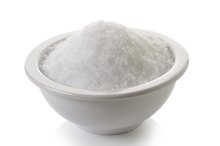What does fact checked mean?
At Healthfully, we strive to deliver objective content that is accurate and up-to-date. Our team periodically reviews articles in order to ensure content quality. The sources cited below consist of evidence from peer-reviewed journals, prominent medical organizations, academic associations, and government data.
The information contained on this site is for informational purposes only, and should not be used as a substitute for the advice of a professional health care provider. Please check with the appropriate physician regarding health questions and concerns. Although we strive to deliver accurate and up-to-date information, no guarantee to that effect is made.
Hydroxybenzoate Side Effects
Hydroxybenzoate, also known as parabens, is an antioxidant and antimicrobal agent widely used in cosmetic products and as a preservative in packaged food and medicines.
What is Hydroxybenzoate?
This chemical, known on product labels as parabens, is based on para-hydroxybenzoic acid, from which the name "parabens" is derived. It is found in four major forms: metylparabens, propylparabens, ethylparabens and butylparabens, which is most commonly used in commercial products. Frequently, combinations of the forms are used. Parabens are found naturally in plant sources. Methylparaben, for example, is found in blueberries, where it serves as an antimicrobial agent.
- This chemical, known on product labels as parabens, is based on para-hydroxybenzoic acid, from which the name "parabens" is derived.
- Methylparaben, for example, is found in blueberries, where it serves as an antimicrobial agent.
Parabens' Commercial Uses
What Are the Side Effects of Parabens?
Learn More
Parabens are commonplace because of their effectiveness as preservatives, their low cost to produce and their long history of safe use. They are believed safe to use in foods because when eaten, they lose most of their capacity to mimic estrogen. Pharmaceutical and cosmetic products use parabens as an antimicrobial agent.
Arguments Against Parabens
Most of the warnings about the dangers of parabens appear in articles on personal websites. If there is evidence--and frequently there is little--they usually cite small-sample studies that claim to show that one of its chemical forms or another is dangerous to your health. These studies are cited to indicate the suspect chemical has made its way into human tissue. For example, one study done in Britain that is often cited reported finding parabens in breast cancer tissue. Without evidence determining the chemical directly caused or contributed to the development of cancer, the finding is not proof of a cause-effect relationship.
- Most of the warnings about the dangers of parabens appear in articles on personal websites.
- Without evidence determining the chemical directly caused or contributed to the development of cancer, the finding is not proof of a cause-effect relationship.
Are Parabens Safe?
What Are the Dangers of Methylparaben?
Learn More
In 1984, the Food and Drug Administration's Cosmetic Ingredients Review determined parabens were safe for use. The World Health Organization, in its International Programme on Chemical Safety, came to a similar conclusion 1. Because of the concern about the possibility of causing cancer, the FDA conducted another review of the data in 2003 and again announced no evidence of harm from the use of parabens.
The American Cancer Society also concluded that scientific evidence did not support a claim that parabens' use in cosmetics increased a person's risk of developing breast cancer. They did suggest that "larger studies are needed to find out what effect, if any, parabens might have on breast cancer risk."
- In 1984, the Food and Drug Administration's Cosmetic Ingredients Review determined parabens were safe for use.
- Because of the concern about the possibility of causing cancer, the FDA conducted another review of the data in 2003 and again announced no evidence of harm from the use of parabens.
Side Effects
If you have normal skin, parabens are generally not irritating. Parabens can cause skin irritation and contact dermatitis in individuals with paraben allergies. Only a small percentage of the general population appears to have this allergy. Parabens' effect on pregnancy is unknown.
- If you have normal skin, parabens are generally not irritating.
- Parabens can cause skin irritation and contact dermatitis in individuals with paraben allergies.
Related Articles
References
Writer Bio
Roy Sylvan has a Ph.D. in communication studies. He directed a large city department of aging, was COO of a consulting company and provided management training to companies and nonprofits. Writing for more than 40 years, Sylvan has authored articles in trade journals, magazines and blogs, and wrote a how-to book on starting a business.









